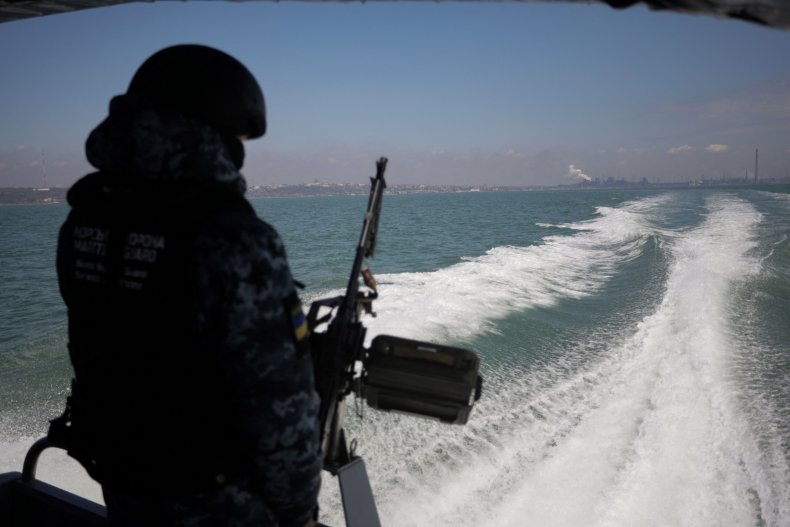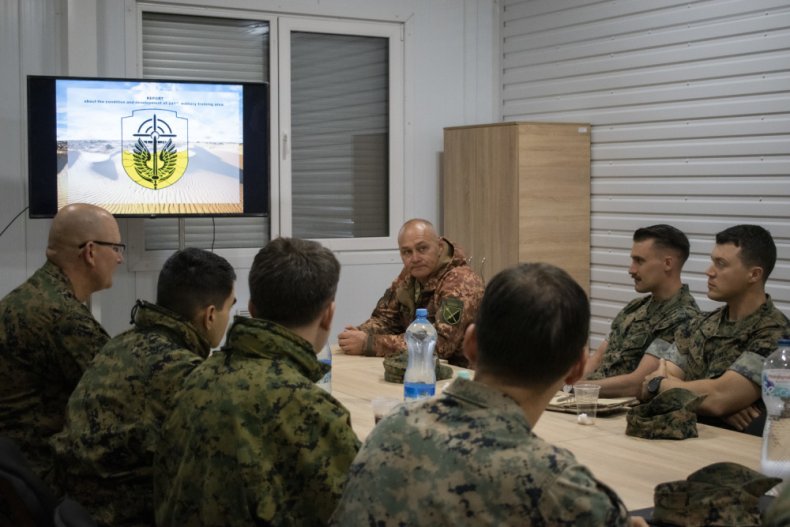Biden to Send $150 Million in Military Aid to Ukraine as Russia Eyes U.S. Forces Ahead of Summit
The Pentagon has announced a $150 million package of military assistance to Ukraine as Russia kept a close eye on U.S. forces preparing to train with their Ukrainian counterparts as well as in the lead up to the debut summit between U.S. President Joe Biden and Russian counterpart Vladimir Putin.
The package is part of the Ukraine Security Assistance Initiative first established in 2016 and the Defense Department said Friday it will include "training, equipment, and advisory efforts to help Ukraine's forces preserve the country's territorial integrity, secure its borders, and improve interoperability with NATO," the 30-nation Western military alliance with which Kyiv has partnered—but not yet been admitted—as it struggles with a pro-Moscow insurgency along the eastern border.
Specifically, the latest set of aid "includes capabilities to enhance the lethality, command and control, and situational awareness of Ukraine's forces through the provision of counter-artillery radars, counter-unmanned aerial systems, secure communications gear, electronic warfare and military medical evacuation equipment" as well as "training and equipment to improve the operational safety and capacity of Ukrainian Air Force bases."
The announcement follows and "complements" a previous $125 million package unveiled in March involving "armed Mark VI patrol boats, counter-artillery radars, tactical equipment, support for a satellite imagery and analysis capability, and equipment to support military medical treatment and combat evacuation procedures."
With it, however, the Pentagon carried a message calling on Ukraine to more closely adhere to NATO values.
This meant a set of reforms to "better align Ukraine's defense enterprise with the core NATO principle of democratic civilian control of the military; adopt a defense industry strategy that better supports the needs of the Ukrainian Armed Forces, bolsters Ukraine's economic competitiveness, and improves corporate governance; adopt foreign direct investment controls based on national security interests; increase efficiency and transparency in the defense procurement cycle; and advance human resources management reforms to align the Ukrainian Armed Forces with a Western-style career management system."
Ukrainian President Volodymyr Zelensky reacted on Twitter, writing that he was "grateful" to the White House "for this important contribution to saving lives of our soldiers & strengthening capabilities of [the Ukrainian] army."
The news came as U.S. and Ukrainian forces readied their annual Exercise Sea Breeze in the Black Sea alongside partnered nations. The drills were scheduled to being on June 28, but Russia has already expressed wariness over U.S. movements in a region in which both powers routinely conduct military activities.
As the U.S. Navy's 6th Fleet announced the entrance of Arleigh Burke-class guided-missile destroyer USS Laboon into the Black Sea on Friday, Russia's National Defense Control Center issued a statement saying that the Russian Black Sea Fleet's "forces and capabilities have started to track" the U.S. warship.

The 6th Fleet said USS Laboon was "conducting multi-domain operations" with a U.S. Navy P-8A reconnaissance plane and a NATO E-3A Airborne Warning and Control System aircraft. The U.S. ship "will conduct maritime security operations alongside NATO Allies and partners in the region with a focus on enhancing maritime stability, combined readiness, and naval capability."
The Russian military has alleged, however, that the Sea Breeze exercise was a cover for a transfer of advanced weaponry from the U.S. to Ukraine.
"Under the guise of the exercise, it is planned to deliver modern weapons, ammunition and material property for the Ukrainian troops," Russian Defense Ministry spokesperson Major General Igor Konashenkov told a press briefing last Wednesday. "In the future, as in previous years, all this will be directed to the Ukrainian troops and nationalist formations stationed near the areas not controlled by Kyiv in the Donetsk and Luhansk regions."
The Russian Defense Ministry, Konashenkov stated at the time, "will closely monitor the course of preparation and conduct of the Ukrainian-American exercise Sea Breeze with the involvement of NATO countries and, if necessary, respond adequately to the evolving situation in the interests of ensuring the military security of the Russian Federation."
The accusation was repeated the next day by Russian permanent representative to the Organization for Security and Cooperation Europe (OSCE) Alexander Lukashevich during an OSCE Permanent Council meeting.
Reached for comment by Newsweek, the 6th Fleet denied the allegations.
"All of the equipment that the U.S. is bringing in support of the SEA BREEZE exercise is leaving with us when the exercise is over," 6th Fleet spokesperson U.S. Navy Commander Kyle Raines said Monday. "Every year we come in with various pieces of equipment but we take them with us when we leave. There is zero truth to claims that U.S. forces will leave any equipment behind."
Raines described Exercise Sea Breeze as a "routine, annual training exercise, co-hosted by the Ukrainian and U.S. navies" that "aims to improve interoperability while promoting regional security and peace."
He argued that the U.S. and its allies had every right to operate in the Black Sea region.
"The Black Sea is an international body of water and the region above it has international airspace," Raines said. "The U.S. Navy operates in international waters around the globe and shares the maritime environment with many countries. The U.S. Navy will continue to operate in international waters, consistent with international law, and with due regard for safety."

The seven-year conflict in Ukraine continues to be an area of contention for strained relations between Moscow and Washington.
Amid political unrest that saw the ouster of previous Ukrainian leadership with better ties to the Kremlin in March 2014, Russia intervened to reclaim Crimea, a move Moscow said was necessary to protect its interests—such as the headquarters of the Black Sea Fleet located there—and those of the peninsula's ethnic Russian majority. Separatists rose up around this same time proclaiming "people's republics" in the provinces of Donetsk and Luhansk, though Russia denies directly backing the rebels.
Nevertheless, Moscow's role led to a downturn in U.S.-Russia ties that have yet to recover. Repeated efforts to solve the conflict have been made through a peace mechanism first established in the Belarusian capital of Minsk and, while a number of truces have been reached, hostilities continue to erupt across the frontlines.
Biden is expected to bring up the war during his first meeting with Putin since taking office in January. The two heads of state are set to meet Wednesday in the Swiss capital of Geneva and discuss a range of issues, also including arms control and cybersecurity as the U.S. seeks to secure a "stable and predictable" ties with Russia.
Kremlin spokesperson Dmitry Peskov said Friday in an interview with CNN that the summit would be a key opportunity to improve "the poor state of the relationship" between the two countries.
Such a meeting, he said, "is the only way...to prevent further degradation of our dialogue."

